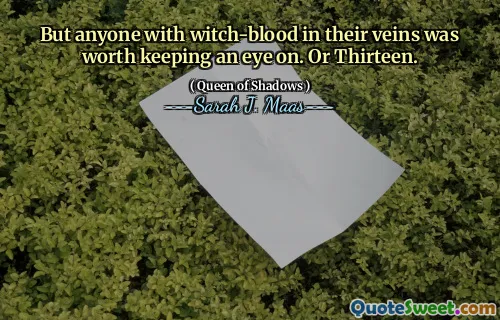
The queen hadn't even bothered to say good-bye. She'd just dashed for the injured Fae warrior, his name like a prayer on her lips. Rowan.
This quote from Sarah J. Maas's 'Queen of Shadows' poignantly captures the depth of loyalty and compassion within a royal figure. The queen's decision to forego the formalities of parting underscores her urgent concern for the injured Fae warrior, highlighting a powerful display of mercy and personal connection over protocol. Her immediate focus on the warrior's well-being suggests a leadership style rooted in empathy and genuine care, contrasting traditional notions of regal aloofness that often prioritize grandeur over per-sonal empathy. The phrase 'his name like a prayer on her lips' evokes a sense of reverence and hope, emphasizing how deeply she is affected by this moment and the importance she places on the warrior's life. It illustrates that her strength lies not just in authority, but in her ability to forge bonds rooted in compassion, even amid chaos and duty. Such a depiction challenges the stereotypical image of a detached monarch, instead presenting a complex character who values human (or Fae) life above all. This act of rushing to aid the injured person illustrates that leadership is often about sacrifice and putting others before oneself. It also serves as a reminder that true courage encompasses compassion and vulnerability. The scene encapsulates a moment of raw emotion and selflessness, demonstrating that power is often wielded most effectively through acts of kindness. Ultimately, Maas's portrayal of this queen underscores a timeless truth: that empathy and courage are the true marks of leadership, capable of inspiring hope even in the darkest times.











